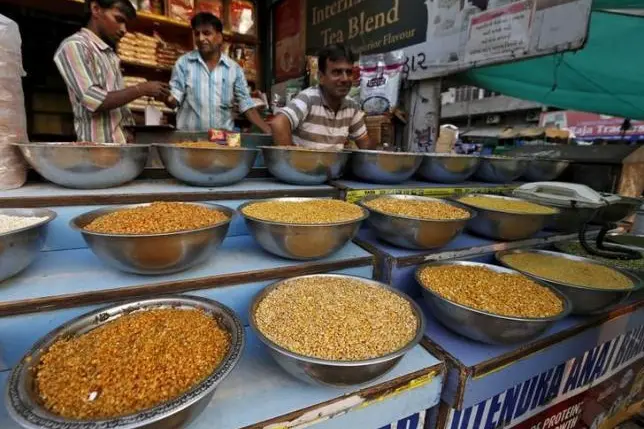PHOTO
By My Pham, Patpicha Tanakasempipat and Rajendra Jadhav
HANOI/BANGKOK/MUMBAI, March 16 (Reuters) - Rice prices in India and Vietnam advanced while Thai prices dropped due to a weaker baht, traders said on Thursday.
India's 5 percent broken parboiled rice prices fell by $3 per tonne to $372 to $377 per tonne on weak demand, even as rupee appreciation was hitting exporters' margins.
"Thai rice is much more competitive than Indian supplies. African and other buyers are switching to Thailand and Vietnam," said M. Adishankar, executive director at Sri Lalitha, a leading rice exporter based in the southern state of Andhra Pradesh.
Indian exporters could not lower prices as the rupee appreciated to the highest level in nearly 17 months, trimming exporters' returns, he said.
The country's rice production in 2016/17 is likely to rise by 4.3 percent to a record high 108.86 million tonnes.
urn:newsml:reuters.com:*:nL4N1G03T6
India, the world's biggest rice exporter, mainly exports non-basmati rice to African countries and premier basmati rice to the Middle East.
"Due to government buying, paddy prices could not fall below a certain level. So exporters have no room to cut rice prices," said a Mumbai based dealer with a global trading firm.
The government agencies buy paddy from farmers for its public distribution system.
Meanwhile, prices in Thailand and Vietnam stayed unchanged in a quiet market.
Thai benchmark 5-percent broken rice RI-THBKN5-P1 stayed put at $350-$355 a tonne, free-on-board (FOB) Bangkok, the same as last week.
Traders said the market remained quiet ahead of an off-season harvest expected in April, so buyers are not in a hurry to buy rice.
"The market outlook seems stable but on the weaker side for the next month," a trader in Bangkok said.
The Thai government will hold an auction for spoiled rice for industrial use on March 23, but it does not affect rice exports, another Bangkok-based trader added.
In Vietnam, the world's third largest rice exporter, 5-percent broken rice
RI-VNBKN5-P1
prices remained stable at $355-$360 a tonne following high local prices.
"This is the main season so local demand is high. Therefore, though there was more supply, local prices are still at a high level," said a Ho Chi Minh-based trader.
Foreign importers were not keen to buy as Vietnamese prices were less competitive than Thai, traders said.
(Reporting by My Pham in Hanoi, Patpicha Tanakasempipiat in Bangkok, and Rajendra Jadhav in Mumbai; Editing by Elaine Hardcastle)
HANOI/BANGKOK/MUMBAI, March 16 (Reuters) - Rice prices in India and Vietnam advanced while Thai prices dropped due to a weaker baht, traders said on Thursday.
India's 5 percent broken parboiled rice prices fell by $3 per tonne to $372 to $377 per tonne on weak demand, even as rupee appreciation was hitting exporters' margins.
"Thai rice is much more competitive than Indian supplies. African and other buyers are switching to Thailand and Vietnam," said M. Adishankar, executive director at Sri Lalitha, a leading rice exporter based in the southern state of Andhra Pradesh.
Indian exporters could not lower prices as the rupee appreciated to the highest level in nearly 17 months, trimming exporters' returns, he said.
The country's rice production in 2016/17 is likely to rise by 4.3 percent to a record high 108.86 million tonnes.
India, the world's biggest rice exporter, mainly exports non-basmati rice to African countries and premier basmati rice to the Middle East.
"Due to government buying, paddy prices could not fall below a certain level. So exporters have no room to cut rice prices," said a Mumbai based dealer with a global trading firm.
The government agencies buy paddy from farmers for its public distribution system.
Meanwhile, prices in Thailand and Vietnam stayed unchanged in a quiet market.
Thai benchmark 5-percent broken rice RI-THBKN5-P1 stayed put at $350-$355 a tonne, free-on-board (FOB) Bangkok, the same as last week.
Traders said the market remained quiet ahead of an off-season harvest expected in April, so buyers are not in a hurry to buy rice.
"The market outlook seems stable but on the weaker side for the next month," a trader in Bangkok said.
The Thai government will hold an auction for spoiled rice for industrial use on March 23, but it does not affect rice exports, another Bangkok-based trader added.
In Vietnam, the world's third largest rice exporter, 5-percent broken rice
"This is the main season so local demand is high. Therefore, though there was more supply, local prices are still at a high level," said a Ho Chi Minh-based trader.
Foreign importers were not keen to buy as Vietnamese prices were less competitive than Thai, traders said.
(Reporting by My Pham in Hanoi, Patpicha Tanakasempipiat in Bangkok, and Rajendra Jadhav in Mumbai; Editing by Elaine Hardcastle)





















